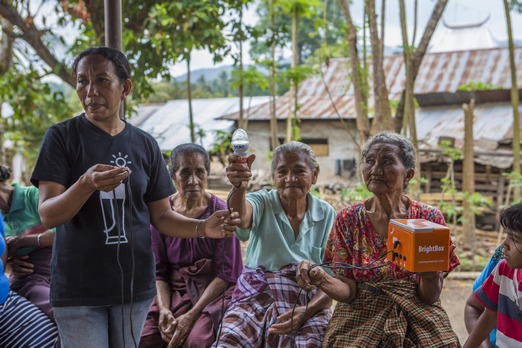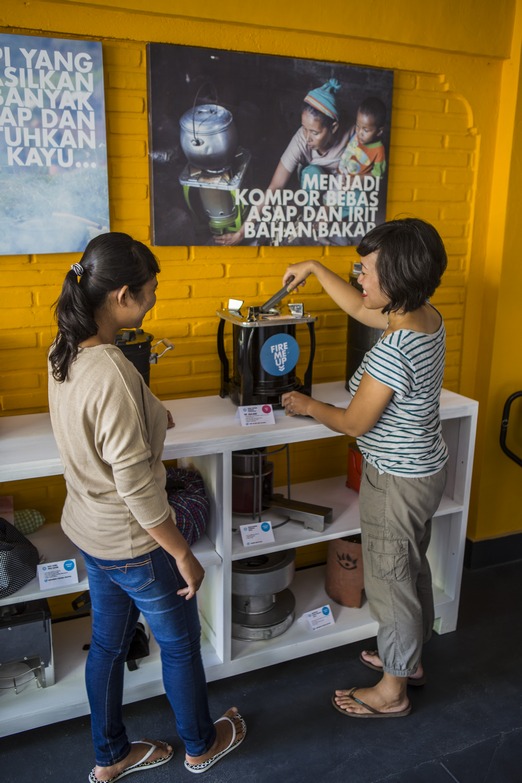Despite rapid modernization in recent decades, many Indonesians still rely on polluting and dangerous kerosene lamps and wood-fired cook stoves. Almost half of the population lives in rural areas, and two-thirds of this population lack access to electricity.
Kopernik’s Ibu Inspirasi initiative is bringing low-carbon technologies to women living in remote rural communities across an archipelago of more than 17,000 islands. The initiative works with local women’s groups to provide rural women with the skills and tools to become green technology agents and to sell small technologies that make a big difference.

Key facts:
- The solar lamps have reduced CO2 emissions by 1,175 tonnes over their five-year lifespan compared to kerosene lamps and the fuel-efficient cook stoves have reduced emissions by approximately 2,560 tonnes compared to wood stoves;
- The water filters have reduced emissions by 794 tonnes by reducing the need to burn fuel to boil water;
- As of May 2014, 105 women were actively participating in regular training sessions and selling technologies in their communities.
The problem
Many families in Indonesia rely on subsistence agriculture, but drought, disease and pests often cause crops to fail. Roads are in varying states of disrepair, isolating villages. Access to electricity ranges from unreliable to non-existent. To escape grinding poverty, people often leave to earn a living through migrant work. Women are not recognized as household heads – this means that women who have been abandoned, widowed, divorced or separated from their husbands cannot access many government services and poverty alleviation programs.
The solution
The technologies are practical and effective. The water filters replace the need to boil water using kerosene or other expensive fuels; solar lights replace dirty, expensive and dangerous kerosene for lighting; fuel-efficient cooking stoves can save 80% in fuel use compared to burning firewood, again saving time and money.
Kopernik has been working in Indonesia since 2012, in partnership with PEKKA, an Indonesian organization supporting women who are the heads of their households. They have introduced solar lights, water filters and fuel-efficient cook stoves to women-headed households.
The women involved in Ibu Inspirasi sell solar lanterns, solar home systems, water filters and fuel-efficient cook stoves in their villages, forming a crucial link in the supply chain connecting life-changing technology with the people who need it the most. At the same time, they are gaining new business skills, building their confidence and boosting their income.
Helping the planet

By enabling families to switch from polluting and dangerous kerosene lanterns to clean solar light, the Ibu Inspirasi initiative is reducing exposure to dangerous black carbon and reducing respiratory problems, eye irritations and myriad other health risks associated with kerosene fumes. By enabling families to switch to fuel-efficient cook stoves, the program is reducing CO2 emissions and helping women to breathe easier as they cook. And by allowing families to maintain a convenient, replenishable source of safe drinking water in their homes, the program is reducing the risk of waterborne diseases.
Helping people
Since 2011, groups of women have sold more than 7,000 solar lanterns, water filters and fuel-efficient cook stoves in their own communities. This provides them with a source of income while replacing carbon-intensive technologies.
Kopernik is providing women in rural communities in Indonesia with the skills and tools they need to become green technology agents.
To start-up their micro-social-businesses, the women participate in three days of training in product knowledge, business planning, financial literacy and public speaking. In their starter kits they receive technologies to sell on consignment, materials to market themselves as technology agents, brochures to help sell the technologies, and order and receipt books to manage their sales.
Spillover effect
The initiative is scalable in that new, low-emission technologies can be continually incorporated into the technology range available to Ibu Inspirasi technology agents.
Customers are encouraged to buy additional technologies with the money they save from previous technology purchases. For example, a customer who initially buys a solar lantern can use the money they save from no longer having to buy kerosene for lighting on a fuel-efficient cook stove.
Kopernik has implemented the Ibu Inspirasi green technology agent initiative in six Indonesian regions to date. The initiative received a grant in May 2014 to expand the initiative across Eastern Indonesia, engaging and training 250 new green technology agents over the next three years.
A customizable toolkit of training and marketing materials makes it easy to expand and adapt the program for new locations. Based on the success of the Ibu Inspirasi initiative as a mechanism for technology distribution and adoption, Kopernik’s medium-term goal is to expand the program into some of the 18 other countries where Kopernik has implemented technology distribution projects to date, with a particular focus on the Asia-Pacific.




Images owned by the activity partners, all rights reserved.

